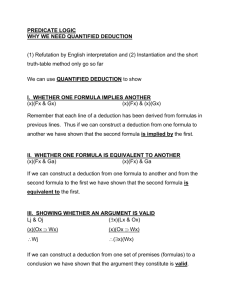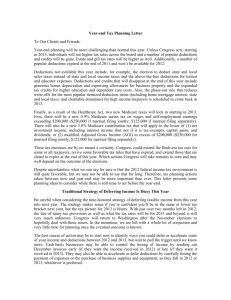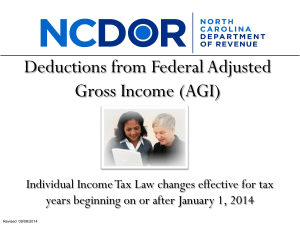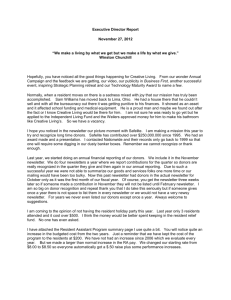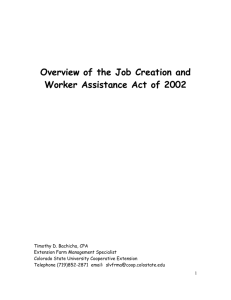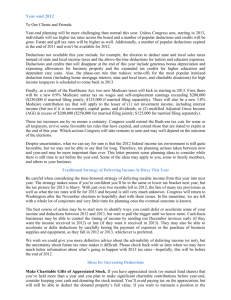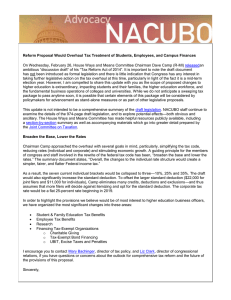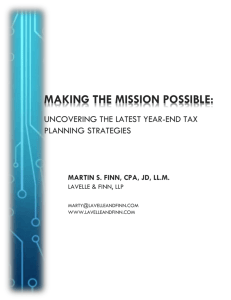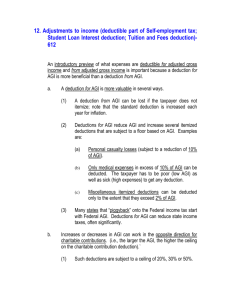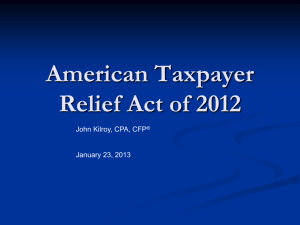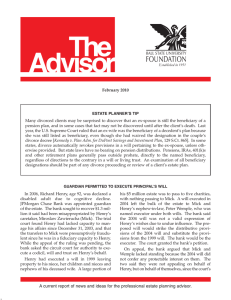Tax Planning PowerPoint
advertisement
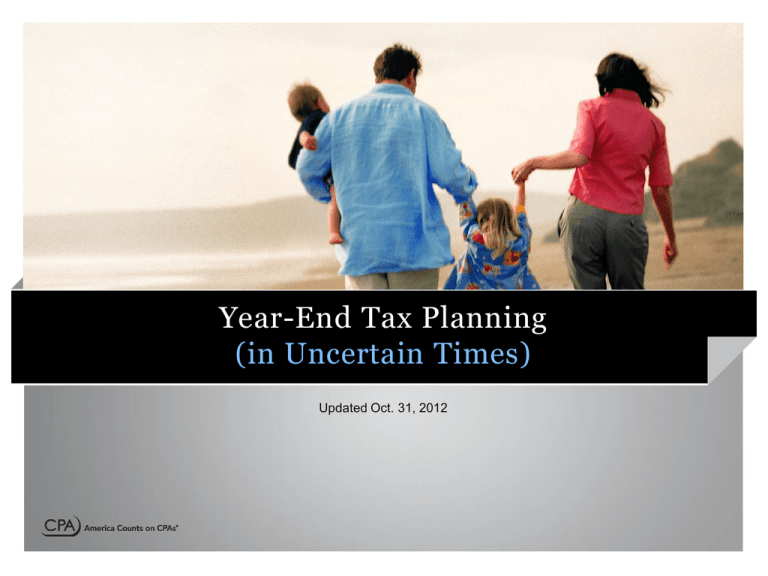
Year-End Tax Planning (in Uncertain Times) Updated Oct. 31, 2012 Overview Where Are We Now? What Is Scheduled to Expire? Year-End Planning Tips 2 Where Are We Now? What We Do Know … • If Congress does nothing - Bush tax cuts will expire - Estate tax extenders will expire • Super Committee - Debt ceiling debate - Required legislation to avoid “automatic” cuts - Temporary measure but deficit debate continues - New debt ceiling looming, possibly by November 2012 • Supreme Court validated PPACA - Health care reform is here to stay - Changes to tax code started in 2010 and continue to 2014 - Tax return compliance is expanding in scope 4 Super Committee and Taxes • Tax reform/revenue raisers - 11/23/11 and 12/23/11 deadlines - Tasked with finding $1.5 trillion savings over 10 years - Result: automatic $1.2 trillion in equal defense and non-defense spending cuts • What was in play - Corporate reform - Bush tax cuts - Taxing large partnerships - International repatriation - Millionaire surtax • New debt ceiling by November 2012 5 Supreme Court Upheld Health Care Reform • Significant tax implications as court upheld action to require all individuals to buy health insurance • Several new tax provisions to pay for new law now in effect • Additional provisions are scheduled to kick in every year • Impacts businesses, small and large, and individuals 6 Schedule of New Health Care Provisions Year Provision 2013 2017 • Flexible spending arrangement the maximum drops to $2,500 per plan year • New “HI” (hospital insurance tax) on high-income taxpayers • New 3.8% Medicare tax on investment income • Medical care itemized deduction threshold increases to 10% of AGI starting in 2013 (except from 2015–2016) • States will be required to provide federally approved insurance plans • Premium assistance credit • Excise tax on uninsured individuals • Excise tax on applicable large employers • Insurer reporting requirements • Eligible premiums included in cafeteria plans • Increase in medical deduction threshold for taxpayers age 65 and over 2018 • Excise tax on high-cost employer plans 2014 7 What is Scheduled to Expire? Key Provisions That Expired in 2011 • Alternative Minimum Tax (AMT) Exemption • State/local sales tax deduction • Bonus Depreciation (for 2012) dropped to 50% • Mortgage insurance premiums deduction • Student loan interest deductions • School teacher expenses • Charitable distributions from IRAs • Research tax credit • Section 179 limit dropped to $139,000 for 2012 9 Provisions That Expire in 2012 • Income tax brackets (10% goes away, 39.6% returns) • Long-term capital gains (15% goes to 20%) • Qualified dividends – 0% / 15% eliminated • Phase-out of personal exemptions • Phase-out of itemized deductions • Marriage penalty • $1,000 child credit resets to $500 • Section 168 Bonus Depreciation expires Likely that some of the expiring provisions may not be extended 10 Estate Tax Expiring Provisions • Estate Taxes - $1 million exemption? - 55% maximum estate tax rate? - No portability of exemption? • Gift Taxes - $1 million lifetime exemption? - 55% maximum rate? • GST Technical Issues - 9100 relief - Default GST allocation for certain trusts 11 3.8% Medicare Tax Starts Jan. 1 • The rules • What is subject to the new tax? • What is not subject to the new tax? 12 Impact of New Tax on Planning • Applies only if modified AGI exceeds $200K for single and $250K for MFJ • Don’t forget to consider new tax when calculating 2013 estimated tax payments • Tax exempt interest is not subject to the tax, so consider if more tax-exempt investments make sense • Consider income included in AGI that is not subject to the tax 13 Start Now! • Don’t wait • Have a Plan A and a Plan B • Use multiple scenarios 14 Why Projections? • Better handle on cash flow • Lower risk of overpaying estimated taxes • Improved income tax planning 15 Multiple Scenarios – Multiple Years • What if Romney gets elected? What if Obama stays in office? • Also, consider the possibility that Congress waits until next year to do something • Possibility for a 60- or 90-day extension on everything • Why it is important to consider multiple years? 16 Year-End Planning Tips Investments • Are you diversified? - What is held in a taxable account vs. retirement account? - Consider Muni bonds (to avoid new Medicare tax in 2013) • Triggering long-term capital gains/losses? - Some may consider triggering gains if they plan on selling in the near future - Others will not trigger losses like they normally do at the end of the year • Accelerating income? - Not limited to investments, also consider ordinary income 18 Other Considerations • Look at stock options that will expire in 2013 or 2014 - Should you exercise them now? - Consider other factors (i.e., blackout periods, current FMV, etc.) - Consider ISOs as well • Understand how real estate will be treated under new Medicare tax • Transfers to younger generation (assuming you avoid Kiddie Tax rules) 19 Defer Deductions? • Many factors in making this type of decision - Alternative Minimum Tax (or AMT) - Return of phase-in and phase-out rules - Possible increase in rates • Not prepaying state income taxes? 20 Charitable Contributions • Phase out of itemized deductions is scheduled to return in 2013! • A 100% charitable contribution this year (with a maximum rate of 35%) is better than a 20% deduction next year (even if the rate is 39.6% or higher) 21 Education Incentives • American Opportunity Tax Credit expires at end of 2012 • Should students prepay student deduction if they have not maximized the deduction for 2012? • The 529 plan still is around and is a great option! 22 Flexible Spending Accounts • Health care FSA contribution will be capped at $2,500 • Be sure to use the 2012 amount in full • It is a “use it or lose it” account • Consider other FSAs 23 Retirement Plans • Qualified Charitable Distributions from IRAs - Popular provision - Should you wait until late in the year … just in case? - Consider getting the form from your broker and follow the right steps in case they make the rule retroactive • Maximize 401(k) contribution (always a good bet!) • Conversions to Roth IRAs - Know what factors to consider before converting - Important to consider the right time – is this the year to convert? 24 Business Entity Considerations • Consider paying/declaring dividends for C Corporations or previous C Corporations before the end of 2012 • Bonus Depreciation/Section 179 • Other business-related issues 25 Conclusions - Best Tips of All! • Don’t get caught off guard - Plan now instead of waiting until the last minute • Engage your CPA year-round - Better to ask about tax consequences before engaging in a particular transaction 26 Trust and Estate Issues • Change in rules • Annual gifting • Direct payments for medical, education, etc. • Other year-end planning moves 27 Questions Copyright © 2011 American Institute of CPAs Copyright © 2011 American Institute of CPAs
